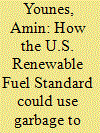|
|
|
Sort Order |
|
|
|
Items / Page
|
|
|
|
|
|
|
| Srl | Item |
| 1 |
ID:
186410


|
|
|
|
|
| Summary/Abstract |
The U.S. Renewable Fuel Standard (RFS) is a key federal program shifting the nation's transportation fuel mix towards lower-carbon alternatives. A 2014 update to the standard included certain types of renewable electricity as qualifying fuels, supporting vehicle electrification within the RFS for the first time. This study investigates the potential under existing regulatory authority to expand deployment of low-carbon waste-to-electricity pathways, yielding revenue that could be used to subsidize electric vehicle (EV) sales or to support other RFS-aligned climate and transport-sector goals. We find that by accounting for drivetrain efficiency in credit allocation and creating a centralized entity to accrue credits, the RFS could generate $8.7 to $24 billion in revenues annually that could be used to provide EV subsidies of $3600 to $9200 or to otherwise accelerate transport electrification. The economic potential for qualifying waste-derived bioelectricity production could meet EV fleet demand to at least 2029. Absent a federal Low Carbon Fuel Standard, or other technology-neutral fuel policy, the RFS could effectively support widespread vehicle electrification. Expansion of waste-derived electricity could mitigate or increase pollutant exposure for some populations, so policy design and implementation must pay close attention to environmental health, justice, and equity.
|
|
|
|
|
|
|
|
|
|
|
|
|
|
|
|
| 2 |
ID:
121260


|
|
|
| 3 |
ID:
112929


|
|
|
|
|
| Publication |
2012.
|
| Summary/Abstract |
The Renewable Fuel Standard (RFS2) under the Energy Independence and Security Act of 2007 requires 15.2 billion gallons of domestic alternative fuels per year by 2012, of which 2 billion gallons must be from advanced biofuel and emit 50% less life-cycle greenhouse gas (GHG) emissions than petroleum-based transportation fuels. Microalgal biodiesel, one type of advanced biofuel, has the qualities and potential to meet the RFS's requirement. A comparative life cycle assessment (LCA) of four microalgal biodiesel production conditions was investigated using a process LCA model with Monte Carlo simulation to assess global warming potential (GWP), eutrophication, ozone depletion and ecotoxicity potentials. The four conditions represent minimum and maximum production efficiencies and different sources of carbon dioxide and nutrient resources, i.e. synthetic and waste resources. The GWP results of the four CO2 microalgal biodiesel production conditions showed that none of the assumed production conditions meet the RFS's GHG requirement. The GWP results are sensitive to energy consumption in harvesting process. Other impacts such as eutrophication, ozone depletion and ecotoxicity potentials, are sensitive to percent lipid content of microalgae, service lifetime of PBRs and quantity of hexane in extraction process, respectively. Net energy ratio and other emissions should be included in future RFS for a more sustainable fuel.
|
|
|
|
|
|
|
|
|
|
|
|
|
|
|
|
| 4 |
ID:
127247


|
|
|
|
|
| Publication |
2014.
|
| Summary/Abstract |
The modified Renewable Fuel Standard (RFS2) prescribes a volume of biofuels to be used in the United States transportation sector each year through 2022. As the dominant component of the transportation sector, we consider the feasibility of the light-duty vehicle (LDV) parc to provide enough demand for biofuels to satisfy RFS2. Sensitivity studies show that the fuel price differential between gasoline and ethanol blendstocks, such as E85, is the principal factor in LDV biofuel consumption. The numbers of flex fuel vehicles and biofuel refueling stations will grow given a favorable price differential. However, unless the feedstock price differential becomes extreme (biomass prices below $100 per dry ton and oil prices above $215 per barrel), which deviates from historical price trends, LDV parc biofuel consumption will fall short of the RFS2 mandate without an enforcement mechanism. Additionally, such commodity prices might increase biofuel consumption in the short-term, but discourage use of biofuels in the long-term as other technologies that do not rely on any gasoline blendstock may be preferable. Finally, the RFS2 program goals of reducing fossil fuel consumption and transportation greenhouse gas emissions could be achieved through other pathways, such as notable improvements in conventional vehicle efficiency.
|
|
|
|
|
|
|
|
|
|
|
|
|
|
|
|
|
|
|
|
|